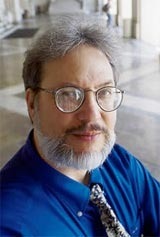From radical atheist to Catholic philosopher
On Monday I'll be posting my just-completed interview with J. Budziszewski about his new book, a revised and expanded edition of What We Can't Not Know: A Guide. I first read Budziszewski's work in the pages of First Things, for which he has written many articles, and I was delighted to hear a few years ago that he, an Anglican, had entered the Catholic Church (in 2004). But before being Anglican, Budziszewski was a Baptist-turned-atheist. And a committed atheist at that. I asked him about his conversion from atheism to Christianity:
What role did natural law play in your conversion from atheism to Christianity? What is the general attitude of atheists toward natural law? How can it be used for serious, civil conversations with atheists and agnostics?

Thirty years ago, my change of view about God, and my change of view about natural law, were intertwined. You might say that I was rediscovering the reality of the Creator and the significance of the order built into his Creation at the same time.
Before that, I was a very radical sort of atheist -- really a nihilist. What I mean is that I didn't just deny the reality of God (that is, of any sort of God who could make a difference). I went much further. I denied that there were any rational grounds for distinguishing between good and evil. I denied that we are responsible for our actions. I denied the very reality of persons. Many atheists, however, are far less radical than I was. Quite often I meet atheists who believe, or want to believe, in the natural law. "Why do I have to believe in God," they ask, "in order to believe in the natural law?
That's a good and welcome question, but it has an answer. Someone who disbelieves in God certainly can believe in the natural law, but he will not find it easy to carry this off. To put a very large problem into just a sentence, how can there be a law without a Lawgiver? One may reply, as some atheists do, that the natural law is "written on the heart" not by God, but by evolution. But if conscience is merely an accidental byproduct of a meaningless and purposeless process that did not have us in mind, then it isn't truly conscience, is it? For in that case, it isn't a witness to a real law; it is merely another blind impulse, one which, had the process gone differently, might have turned out a different way that would be equally arbitrary. Instead of caring for our young, we might have eaten them, like guppies, and there would be no grounds for passing judgment. It wouldn't be wrong; it wouldn't be right; it would just be.
I think, then, that the atheist who is convinced of the reality of a real natural law has the best of reasons to abandon his atheism, and acknowledge the reality of the Lawgiver. But I hope this open-minded atheist will go further still. Law, by itself, has a heart of stone. It tells us what is required, but it says nothing of the possibility of mercy, of forgiveness, of restoration. By itself, considering the depth of our failings, it gives us more motive to look away, than to look — to avert our eyes from what we know we do not fulfill. But as Christian faith declares, the law is not "by itself." The God who is the author of nature is not an impersonal Something with no interest in us; he is also the author of grace.
Other questions addressed in the interview include the importance and history of the natural law tradition, the myth of Enlightenment-inspired "neutrality", Islam and natural law, and the character (or lack thereof) of popular discussion and debate about natural law.
• The Scandal of Natural Law | Interview with J. Budziszewski
• Objections, Obstacles, Acceptance | Interview with J. Budziszewski
• Natural Law and Bearing False Witness | J. Budziszewski | A selection from the revised and expanded edition of What We Can't Not Know: A Guide.
Carl E. Olson's Blog
- Carl E. Olson's profile
- 20 followers



